-
 Bitcoin
Bitcoin $84,627.8074
-0.67% -
 Ethereum
Ethereum $1,864.2399
-2.65% -
 Tether USDt
Tether USDt $1.0000
0.00% -
 XRP
XRP $2.0927
-2.53% -
 BNB
BNB $598.1054
-1.97% -
 Solana
Solana $124.8602
-1.22% -
 USDC
USDC $1.0000
-0.01% -
 Dogecoin
Dogecoin $0.1690
-2.36% -
 Cardano
Cardano $0.6667
-2.33% -
 TRON
TRON $0.2374
0.13% -
 Toncoin
Toncoin $3.9597
-2.40% -
 Chainlink
Chainlink $13.5353
-4.79% -
 UNUS SED LEO
UNUS SED LEO $9.4239
0.74% -
 Stellar
Stellar $0.2665
-2.47% -
 Avalanche
Avalanche $18.8622
-3.42% -
 Sui
Sui $2.3649
-2.87% -
 Shiba Inu
Shiba Inu $0.0...01245
-2.30% -
 Hedera
Hedera $0.1679
-2.22% -
 Litecoin
Litecoin $85.3854
0.85% -
 Polkadot
Polkadot $4.0835
-2.36% -
 MANTRA
MANTRA $6.3305
-0.14% -
 Bitcoin Cash
Bitcoin Cash $301.8122
-2.65% -
 Bitget Token
Bitget Token $4.5802
-1.17% -
 Dai
Dai $0.9997
-0.03% -
 Ethena USDe
Ethena USDe $0.9998
-0.01% -
 Pi
Pi $0.6674
-5.90% -
 Hyperliquid
Hyperliquid $12.8713
-3.72% -
 Monero
Monero $220.0413
0.58% -
 Uniswap
Uniswap $6.0895
-3.69% -
 Aptos
Aptos $5.2723
-2.31%
What is the basis for the ranking of Chinese blockchain apps?
Chinese blockchain apps are ranked based on user base, transaction volume, innovation, compliance, and more, helping users make informed choices.
Apr 01, 2025 at 10:56 pm
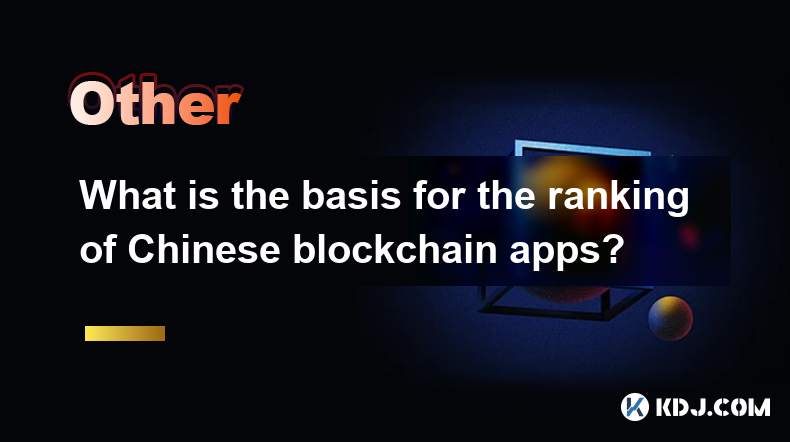
The ranking of Chinese blockchain apps is determined by a variety of factors that reflect their performance, adoption, and impact within the cryptocurrency ecosystem. These factors include user base, transaction volume, technological innovation, and regulatory compliance. Understanding these criteria can help users and investors make informed decisions about which apps to engage with. In this article, we will delve into each of these factors in detail, providing a comprehensive overview of how Chinese blockchain apps are ranked.
User Base
The size and growth of a blockchain app's user base is a critical metric for ranking. A large and expanding user base indicates that the app is popular and trusted by users. Apps that successfully attract and retain users are often seen as more valuable and influential within the ecosystem.
To measure the user base, app developers and ranking platforms typically look at the number of active users, the rate of new user acquisition, and user retention rates. For instance, an app that consistently adds new users and maintains high engagement levels is likely to rank higher than one with stagnant or declining user numbers.
Transaction Volume
Transaction volume is another key indicator of an app's performance. High transaction volumes suggest that the app is being used frequently for its intended purpose, whether that be trading, transferring assets, or other blockchain-based activities. This metric is often used to gauge the liquidity and utility of the app.
To assess transaction volume, analysts look at the total number of transactions processed by the app over a given period, as well as the average transaction value. Apps that handle a large number of transactions, especially those with significant monetary value, are typically ranked higher. This is because high transaction volumes indicate a robust and active user community.
Technological Innovation
Technological innovation is a crucial factor in the ranking of Chinese blockchain apps. Apps that introduce new features, improve existing functionalities, or leverage cutting-edge technologies tend to stand out in the competitive landscape. Innovation can drive user adoption and enhance the overall user experience, thereby boosting an app's ranking.
Examples of technological innovations in blockchain apps include the implementation of smart contracts, the use of advanced consensus mechanisms, and the integration of artificial intelligence. Apps that pioneer these technologies or offer unique solutions to common problems are often recognized and ranked higher. This is because innovation is seen as a key driver of long-term success and growth in the blockchain industry.
Regulatory Compliance
Regulatory compliance is an essential consideration for the ranking of Chinese blockchain apps. Given the stringent regulatory environment in China, apps that adhere to local laws and regulations are more likely to be viewed favorably. Compliance ensures that the app can operate legally and sustainably, which is crucial for its long-term viability.
To evaluate regulatory compliance, ranking platforms consider whether the app has obtained necessary licenses, follows anti-money laundering (AML) and know-your-customer (KYC) protocols, and adheres to data protection regulations. Apps that demonstrate a strong commitment to compliance are often ranked higher, as they are less likely to face regulatory hurdles that could impede their growth and operations.
Market Perception and Brand Reputation
Market perception and brand reputation play a significant role in the ranking of Chinese blockchain apps. Apps that are well-regarded by users, investors, and industry experts tend to rank higher. Positive market perception can be influenced by factors such as the app's track record, the reputation of its development team, and its overall impact on the blockchain ecosystem.
To gauge market perception, ranking platforms often consider user reviews, media coverage, and endorsements from influential figures in the industry. Apps that receive positive feedback and are frequently mentioned in reputable sources are likely to be ranked higher. This is because a strong brand reputation can attract more users and investors, thereby enhancing the app's overall value and influence.
Security and Reliability
Security and reliability are paramount for the ranking of Chinese blockchain apps. Users and investors need to trust that their assets and data are safe when using these apps. Apps that demonstrate robust security measures and a track record of reliability are often ranked higher.
To assess security and reliability, ranking platforms look at factors such as the app's history of security breaches, the effectiveness of its security protocols, and its uptime and performance. Apps that have never experienced significant security incidents and consistently provide a reliable service are more likely to be ranked higher. This is because security and reliability are critical for maintaining user trust and ensuring the app's long-term success.
Integration and Interoperability
Integration and interoperability are important factors in the ranking of Chinese blockchain apps. Apps that can seamlessly integrate with other platforms and services, and that support interoperability with different blockchain networks, are often ranked higher. This is because integration and interoperability enhance the app's utility and appeal to users.
To evaluate integration and interoperability, ranking platforms consider the app's ability to connect with popular wallets, exchanges, and other blockchain services. Apps that offer a wide range of integration options and support cross-chain transactions are likely to be ranked higher. This is because such capabilities can significantly enhance the user experience and increase the app's overall value.
Community Engagement
Community engagement is another key factor in the ranking of Chinese blockchain apps. Apps that actively engage with their user community, respond to feedback, and foster a sense of community are often ranked higher. Strong community engagement can drive user loyalty and enhance the app's reputation.
To assess community engagement, ranking platforms look at the app's social media presence, the frequency and quality of its communications with users, and its involvement in community events and initiatives. Apps that maintain an active and supportive community are more likely to be ranked higher. This is because community engagement is seen as a vital component of user satisfaction and long-term success.
Economic Model and Tokenomics
The economic model and tokenomics of a blockchain app are crucial for its ranking. Apps that have a well-designed economic model and tokenomics that incentivize user participation and growth are often ranked higher. A strong economic model can drive the app's adoption and sustainability.
To evaluate the economic model and tokenomics, ranking platforms consider factors such as the app's token distribution, the incentives for users and developers, and the overall economic sustainability of the platform. Apps that offer clear and attractive incentives, and that have a sustainable economic model, are likely to be ranked higher. This is because a robust economic model is essential for the app's long-term success and growth.
Scalability and Performance
Scalability and performance are important considerations for the ranking of Chinese blockchain apps. Apps that can handle a high volume of transactions and maintain fast processing times are often ranked higher. Scalability and performance are critical for ensuring that the app can meet the growing demands of its user base.
To assess scalability and performance, ranking platforms look at the app's transaction throughput, processing speed, and its ability to scale as the user base grows. Apps that demonstrate strong scalability and performance are more likely to be ranked higher. This is because these factors are essential for maintaining user satisfaction and ensuring the app's long-term viability.
User Experience and Interface
User experience (UX) and interface are key factors in the ranking of Chinese blockchain apps. Apps that offer a user-friendly and intuitive interface, and that provide a seamless user experience, are often ranked higher. A strong UX and interface can drive user adoption and satisfaction.
To evaluate UX and interface, ranking platforms consider factors such as the app's ease of use, the clarity of its design, and the overall user satisfaction. Apps that receive positive feedback on their UX and interface are more likely to be ranked higher. This is because a good user experience is essential for attracting and retaining users.
Partnerships and Collaborations
Partnerships and collaborations are important for the ranking of Chinese blockchain apps. Apps that have established strong partnerships with other companies, organizations, or blockchain projects are often ranked higher. Partnerships can enhance the app's credibility, expand its reach, and drive its growth.
To assess partnerships and collaborations, ranking platforms look at the app's network of partners, the nature of these partnerships, and the benefits they bring to the app. Apps that have formed strategic partnerships with reputable entities are more likely to be ranked higher. This is because partnerships can significantly enhance the app's value and influence within the blockchain ecosystem.
Frequently Asked Questions
Q: What are the main factors considered in ranking Chinese blockchain apps?
- The main factors include user base, transaction volume, technological innovation, regulatory compliance, market perception, security and reliability, integration and interoperability, community engagement, economic model and tokenomics, scalability and performance, user experience and interface, and partnerships and collaborations.
Q: Why is user base important for ranking blockchain apps?
- A large and growing user base indicates that the app is popular and trusted, which can enhance its value and influence within the ecosystem.
Q: How does transaction volume affect an app's ranking?
- High transaction volumes suggest that the app is being used frequently, indicating its liquidity and utility, which can lead to a higher ranking.
Q: What role does technological innovation play in the ranking of blockchain apps?
- Technological innovation can drive user adoption and enhance the user experience, making apps that introduce new features or leverage cutting-edge technologies more likely to rank higher.
Q: Why is regulatory compliance important for Chinese blockchain apps?
- Compliance with local laws and regulations ensures that the app can operate legally and sustainably, which is crucial for its long-term viability and ranking.
Q: How does market perception and brand reputation influence an app's ranking?
- Positive market perception and a strong brand reputation can attract more users and investors, thereby enhancing the app's overall value and influence, leading to a higher ranking.
Q: What is the significance of security and reliability in ranking blockchain apps?
- Security and reliability are essential for maintaining user trust and ensuring the app's long-term success, making apps with strong security measures and reliability more likely to rank higher.
Q: Why are integration and interoperability important for blockchain apps?
- Integration and interoperability enhance the app's utility and appeal to users, making apps that can seamlessly connect with other platforms and support cross-chain transactions more likely to rank higher.
Q: How does community engagement affect an app's ranking?
- Strong community engagement can drive user loyalty and enhance the app's reputation, making apps that actively engage with their user community more likely to rank higher.
Q: What role do the economic model and tokenomics play in ranking blockchain apps?
- A well-designed economic model and tokenomics can drive user participation and growth, making apps with strong economic models more likely to rank higher.
Q: Why are scalability and performance important for blockchain apps?
- Scalability and performance are critical for ensuring that the app can meet the growing demands of its user base, making apps with strong scalability and performance more likely to rank higher.
Q: How does user experience and interface impact an app's ranking?
- A user-friendly and intuitive interface can drive user adoption and satisfaction, making apps with strong UX and interface more likely to rank higher.
Q: What is the importance of partnerships and collaborations in ranking blockchain apps?
- Partnerships and collaborations can enhance the app's credibility, expand its reach, and drive its growth, making apps with strong partnerships more likely to rank higher.
Disclaimer:info@kdj.com
The information provided is not trading advice. kdj.com does not assume any responsibility for any investments made based on the information provided in this article. Cryptocurrencies are highly volatile and it is highly recommended that you invest with caution after thorough research!
If you believe that the content used on this website infringes your copyright, please contact us immediately (info@kdj.com) and we will delete it promptly.
- Rollblock (RBLK) Price Prediction: Will the Memecoin Reach $7 This Year?
- 2025-04-03 06:05:12
- Resistance at $0.72: Make-or-Break Level for ADA
- 2025-04-03 06:05:12
- Avalanche (AVAX/USD) Could Deliver the Strongest Gains Among Major Digital Assets
- 2025-04-03 06:00:12
- Japan's Second Largest Bank Set to Launch Stablecoin with Ava Labs
- 2025-04-03 06:00:12
- AVAX Price Prediction: Standard Chartered Expects Significant Gains, Surpassing BTC and ETH
- 2025-04-03 05:55:12
- Pepecoin (PEPE) Trades Sideways, But Analysts Anticipate a Strong Breakout
- 2025-04-03 05:55:12
Related knowledge

What are the future development trends of blockchain game development?
Apr 03,2025 at 05:00am
Blockchain technology has revolutionized various industries, and gaming is no exception. As we look to the future, several trends are set to shape the development of blockchain games. These trends not only promise to enhance the gaming experience but also to integrate blockchain technology more seamlessly into the gaming ecosystem. Let's explore these t...
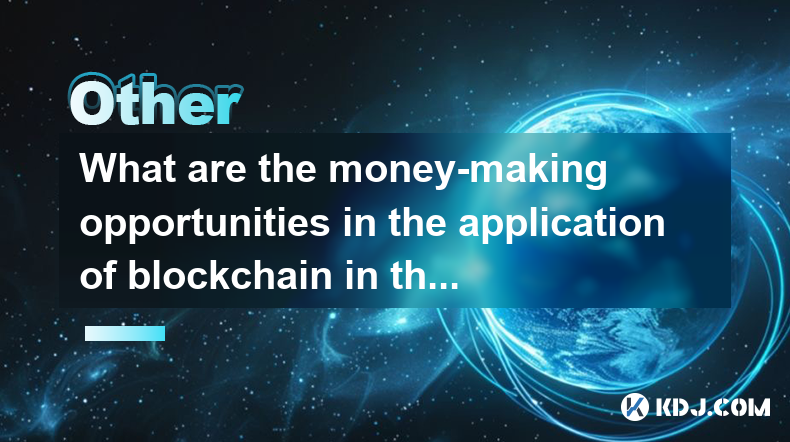
What are the money-making opportunities in the application of blockchain in the medical industry?
Apr 03,2025 at 03:35am
The integration of blockchain technology into the medical industry presents a myriad of money-making opportunities that can revolutionize healthcare systems. Blockchain's inherent characteristics, such as transparency, security, and immutability, make it an ideal solution for various medical applications. By leveraging blockchain, companies can develop ...
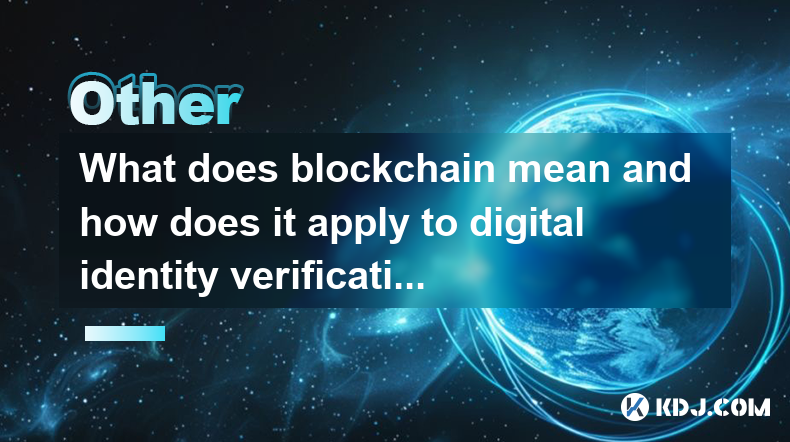
What does blockchain mean and how does it apply to digital identity verification?
Apr 03,2025 at 02:21am
Blockchain technology, at its core, is a decentralized and distributed digital ledger used to record transactions across numerous computers. This ensures that the recorded data cannot be altered retroactively without the alteration of all subsequent blocks and the consensus of the network. The concept of blockchain was initially devised for the digital ...
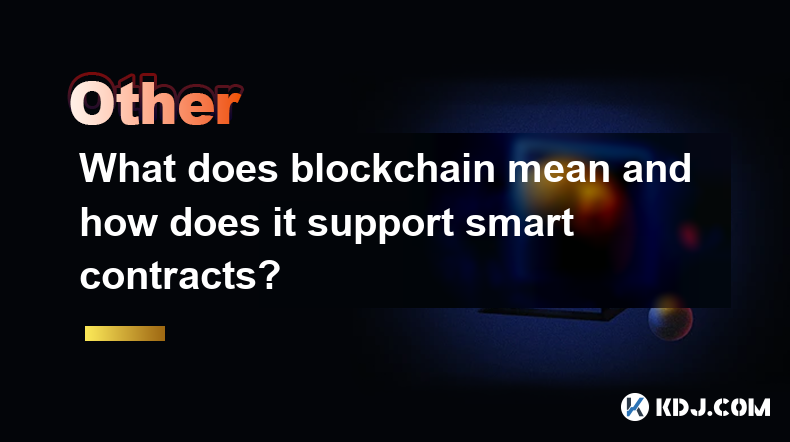
What does blockchain mean and how does it support smart contracts?
Apr 03,2025 at 02:28am
Blockchain technology is a decentralized, distributed ledger that records transactions across numerous computers. It ensures that once data is recorded, it cannot be altered retroactively without the alteration of all subsequent blocks and the consensus of the network. This technology is the backbone of cryptocurrencies like Bitcoin and Ethereum. Blockc...
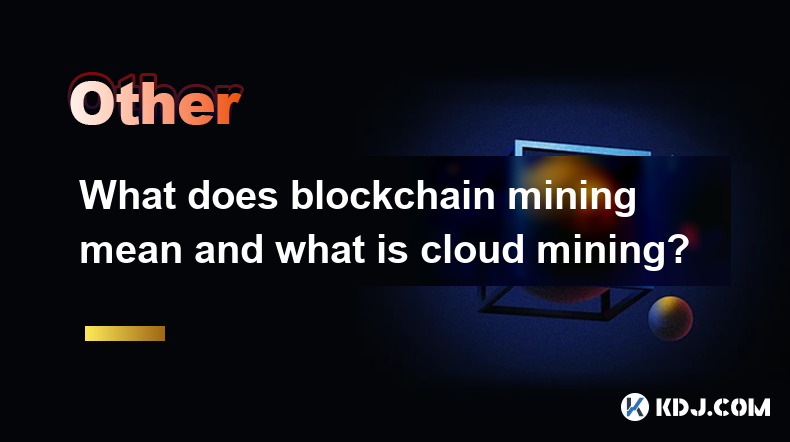
What does blockchain mining mean and what is cloud mining?
Apr 03,2025 at 02:01am
Blockchain mining is the process by which new transactions are verified and added to the blockchain ledger. It involves solving complex mathematical problems using computational power, which results in the creation of new cryptocurrency units as a reward. Miners compete to solve these problems, and the first one to find the solution gets to add a new bl...
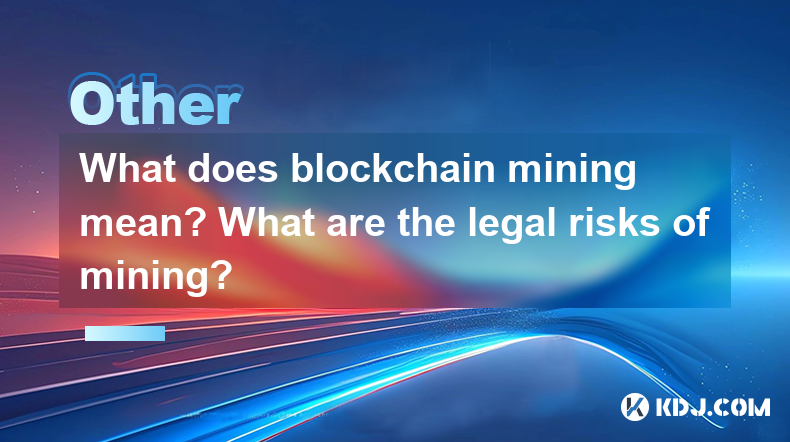
What does blockchain mining mean? What are the legal risks of mining?
Mar 31,2025 at 05:07pm
Blockchain mining is the process by which transactions are verified and added to the public ledger, known as the blockchain. Miners use powerful computers to solve complex mathematical problems, which, once solved, allow them to add a block of transactions to the blockchain. In return, miners are rewarded with cryptocurrency, typically Bitcoin. This pro...

What are the future development trends of blockchain game development?
Apr 03,2025 at 05:00am
Blockchain technology has revolutionized various industries, and gaming is no exception. As we look to the future, several trends are set to shape the development of blockchain games. These trends not only promise to enhance the gaming experience but also to integrate blockchain technology more seamlessly into the gaming ecosystem. Let's explore these t...

What are the money-making opportunities in the application of blockchain in the medical industry?
Apr 03,2025 at 03:35am
The integration of blockchain technology into the medical industry presents a myriad of money-making opportunities that can revolutionize healthcare systems. Blockchain's inherent characteristics, such as transparency, security, and immutability, make it an ideal solution for various medical applications. By leveraging blockchain, companies can develop ...

What does blockchain mean and how does it apply to digital identity verification?
Apr 03,2025 at 02:21am
Blockchain technology, at its core, is a decentralized and distributed digital ledger used to record transactions across numerous computers. This ensures that the recorded data cannot be altered retroactively without the alteration of all subsequent blocks and the consensus of the network. The concept of blockchain was initially devised for the digital ...

What does blockchain mean and how does it support smart contracts?
Apr 03,2025 at 02:28am
Blockchain technology is a decentralized, distributed ledger that records transactions across numerous computers. It ensures that once data is recorded, it cannot be altered retroactively without the alteration of all subsequent blocks and the consensus of the network. This technology is the backbone of cryptocurrencies like Bitcoin and Ethereum. Blockc...

What does blockchain mining mean and what is cloud mining?
Apr 03,2025 at 02:01am
Blockchain mining is the process by which new transactions are verified and added to the blockchain ledger. It involves solving complex mathematical problems using computational power, which results in the creation of new cryptocurrency units as a reward. Miners compete to solve these problems, and the first one to find the solution gets to add a new bl...

What does blockchain mining mean? What are the legal risks of mining?
Mar 31,2025 at 05:07pm
Blockchain mining is the process by which transactions are verified and added to the public ledger, known as the blockchain. Miners use powerful computers to solve complex mathematical problems, which, once solved, allow them to add a block of transactions to the blockchain. In return, miners are rewarded with cryptocurrency, typically Bitcoin. This pro...
See all articles
























































































